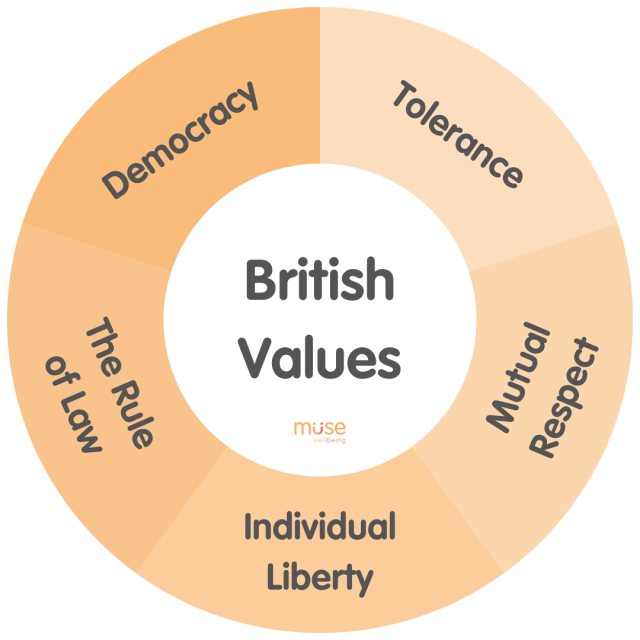Teaching British Values in Primary Schools

David is the Muse Wellbeing director and lead curriculum developer. His Main passions include education, surfing and travelling.

George is an international school teacher based in Asia. A passionate language learner and polyglot, he thrives in diverse classrooms.
Teaching British Values in Primary Schools
Teaching British values in primary schools is both important and compulsory within independent and state-maintained schools . In 2014 the Department for Education changed its guidance from schools having to ‘respect’ British values, to schools having to ‘actively promote’ the five major British values.
At the time of the change, the Parliamentary Under Secretary of State for Schools stated the change was designed to “tighten up the standards on pupil welfare to improve safeguarding, and the standards on spiritual, moral, social and cultural development of pupils to strengthen the barriers to extremism”
Why Do We Teach British Values in Schools?
British values go beyond teaching pupils tolerance and respect for other beliefs and cultures outside of what they might experience at home or within their shared communities. They provide a learning environment free from discrimination and stereotyping. This models to pupils just what it is to be a citizen within modern Britain.
Until 2014, schools were required to respect British values but with the ever-changing world, the Department for Education made the decision to release guidance on promoting British values in schools and early years settings and now they must be actively promoted within the classroom and school as a whole. British values are expected to be embedded in the culture of the school and classroom and teachers must prove that work with pupils is actively teaching British values.
The five major British values were first set out in 2011 as part of the Prevent duty to stop young people from being drawn into terrorist organisations or ideals. Teaching British values in schools encourages children to learn about different belief systems and have tolerance towards others. Not only do British values safeguard children, but they also prepare them for the modern world and life beyond education.
What Are The Five Major British Values?
The five British values are:
- Democracy
- The Rule of Law
- Individual Liberty
- Mutual Respect
- Tolerance for those of Different Faiths and Beliefs

Each of these values can be taught and promoted in different ways and should be firmly embedded in all primary classrooms. While teachers may choose to look at British values, why we have them and why they’re important as part of PSHE lessons, each value should also be embedded throughout the school and continuously promoted in different topics and areas of work.
British values in primary schools can be promoted in many ways within the classroom setting or the wider school. The DfE expects all pupils to have a certain knowledge and understanding of British values so by promoting them across the curriculum it becomes easier for children to learn these values with the hopes that they help to shape more tolerant and respectful citizens for the future. Here are some examples of what children are expected to learn about British values in schools:
- How citizens can influence decision-making in democratic processes and how to participate in these. This should include respect for the law.
- Encourage students to have respect and tolerance for their own and other cultures and that this shouldn’t be the cause of discriminatory behaviour. This should also cover the right to have no faith or beliefs.
- Students should be able to distinguish between right and wrong and respect civil and criminal law
How To Promote British Values in the Classroom
There are many ways to promote British values with our school though with an increasing workload, it can feel like extra pressure to ensure that students are actively learning about each of the five values. However, their importance in shaping resilient, confident and respectful minds cannot be overlooked and thankfully there are many simple ways to promote British values in primary schools.
Democracy
Everyone involved in a school setting has the right to have their voice heard. This includes pupils, parents and also staff members. Pupil-elected school councils are a great way to introduce democratic processes to pupils and these processes can even be used for electing children for certain classroom jobs and discussing classroom rules.
Democracy isn’t just about blindly following what everyone else does though and children should be made aware that having a difference of opinion is OK and how perceived injustices can be peacefully challenged.
Assemblies are also a great opportunity to look at current affairs and how they link to democracy and this whole school approach helps to further embed British values in schools.
Parents and guardians should be allowed to express their opinions and raise any concerns through parents’ evenings and suggestion boxes.
The Rule of Law
Pupils should regularly reflect on their learning and behaviour and be able to distinguish between right and wrong. Within this, pupils should take responsibility for their actions. Allowing students to participate in creating classroom and school rules and having a reward system in place can help with the rule of law.
Having the police as guest speakers during whole school assemblies as part of the wider curriculum also reinforces the importance of respecting civil and criminal laws.
Individual Liberty
Children should be supported in a safe environment to understand that they have personal rights and freedoms and how these can be safely achieved. Pupils should be allowed to respectfully express their views to build their self-esteem and knowledge.
Independence is a key part of individual liberty and PSHE lessons can help teach students to be as independent as possible whilst promoting a strong anti-bullying culture that challenges stereotypes.
Mutual Respect and Tolerance of Those of Different Faiths or Beliefs
The final two British values are usually put together as they promote similar ideologies. These two values are all about giving children the opportunity to learn about different faiths and beliefs to help them understand how these might differ from their own.
PSHE lessons can help children understand the differences between faith, ethnicity, disability, gender or sexuality and differences in family situations. Muse Wellbeing provides a comprehensive PSHE curriculum that can support the promotion of all five British values.
As part of religious education children should also have access to trips to places of worship and links with faith communities.
Does Ofsted Look at British Values During an Inspection?
Since the 2014 DfE guidance was published, Ofsted now takes the work done on British values into account during inspections. Teaching British values in schools is part of Ofsted’s personal development evaluation which looks at how well the curriculum extends beyond academic subjects. It is expected that the staff, pupils and governors are aware of the five British values and how they are promoted within the school. Any British value policies created by the school can also be shared with inspectors during their visit.
Teaching British Values in an EYFS Setting
Under the Dfe 2014 guidance, EYFS settings are also required to promote and teach British values. They are woven into the EYFS areas of learning and development to teach children to celebrate their differences, be kind and respectful and how to be tolerant of others.
Although the Muse Wellbeing PSHE curriculum only covers lessons for years 1-6, many EYFS practitioners are already promoting British values in their everyday teaching and may find some of the resources included in the whole school Muse Wellbeing subscription helpful for preparing children for their transition into year 1.
Ofsted inspectors consider how British values are promoted in the setting and how they’re being supported by practitioners so it isn’t just down to years 1-6 to be able to embed these values. The earlier children are introduced to British values in primary school, the easier it will become second nature to them.
Final Thoughts
The Muse Wellbeing PSHE curriculum is a great tool for supporting the teaching of British values and PSHE lessons are the perfect opportunity to look at British values in more detail and open up discussion with students.
However, British values cannot exclusively be taught in PSHE and must be a part of the whole school culture. British values should be encompassed in everything schools do from assemblies, trips, extra-curricular activities and even how rules are set.
Ofsted inspectors are looking for British values to be a part of everyday teaching and for staff and students to know how the different ways these values are embedded whether that is through school council meetings, mock elections, guest speakers in assemblies from faith communities or emergency services or parents’ meetings.
Muse Wellbeing
Subscribe for RSHE & Wellbeing Updates & Learning Resources

Copyright © 2026 Muse | All Rights Reserved.
Would you like to logout of Muse Wellbeing?


